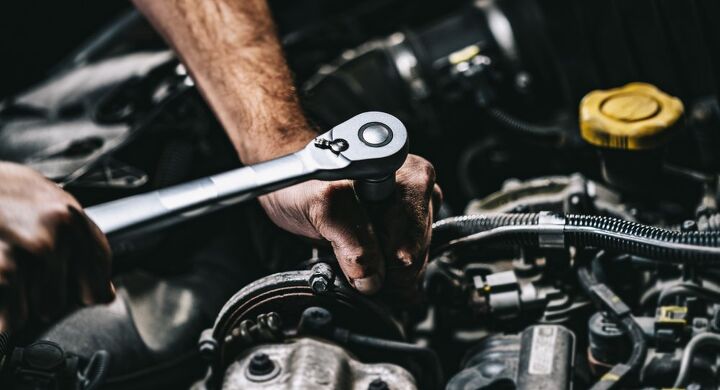#VehicleRepair
Study Suggests Public Supports Right-to-Repair Movement
Most people who know their way around a wrench will tell you that vehicles haven’t gotten any easier to work on over the years. While modern automobiles tend to be longer lived than earlier models and on-board diagnostics have made issues somewhat easier to diagnose, decades of added complexity have made resolving those problems substantially more troublesome and costly. Modern engine layouts are focused on packaging, not on providing mechanics with easy access, and the sheer number of electrical components in today’s cars means that many parts that could have been repaired before now have to be replaced.
Right-to-Repair Movement Gets Federal Attention
While the right-to-repair movement is fighting a national battle, the brunt of the action has been taking place on America’s coasts. Consumer activists are taking on multinational corporations that don’t want you to modify your mobile devices, affix aftermarket components to your vehicle, or have complete access to the data that’s amassed by the staggering number of products that are needlessly networked to the internet. After years of petitioning the government, often while arguing with high-paid lobbyists, the group achieved a major victory in Massachusetts in 2020. Voters decided that automakers should not be allowed to withhold information from the vehicle’s owner or use it as a way to prohibit them from taking their car into independent repair shops (rather than manufacturer-certified service centers) or tinkering with it themselves.
Now the federal government is getting involved. Joe Biden has signed an executive order that effectively forces the Federal Trade Commission (FTC) to take regulatory action that would settle the matter. But we don’t really know if that’s going to lead to a market where customers are free to treat their property (and private data) as they wish, one where the manufacturer holds all the cards, or simply result in a regulatory minefield displeasing all parties.
Honda Recalls 1.4 Million Vehicles in Multiple Campaigns
On Tuesday, Honda announced a bevy of recalls encompassing more than 1.4 million automobiles sold in the United States. Split between several campaigns, the recalls encompass everything from dissolving driveshafts to bum window controls that could potentially result in a vehicle fire.
According to reports issued via the National Highway Traffic Safety Administration, the first and most-pressing issue involves the 2002-2006 Honda CR-V. Crossovers introduced to moisture could see their power window switches failing. If sufficient moisture is applied to the wires, Honda stated that there is some risk of a “thermal event.” As of November, the automaker said it was aware of 87 such instances and 23 reported events of fire.
Automotive Alliance Manages to Delay Revised Massachusetts Right to Repair Law
The Alliance for Automotive Innovation (AAI) has managed to stall enforcement of a ballot measure recently passed in Massachusetts that expands access to data related to vehicle maintenance and repair. Last week, the relatively new lobbying/trade group asked a U.S. district court for a temporary order that would bar implementation of the state’s new right-to-repair rules aimed at giving vehicle owners more direct control of their private data and independent repair shops a fighting chance of staying in business. But the state’s attorney general has already decided that the rules are invalid until after federal cases have been decided.
The decision represents another victory for giant, multinational corporations at the expense of disgusting citizens interested in controlling their personal information and small business owners who have had it easy for far too long.
It's Payback Time: Right-to-repair Movement Targets John Deere
With the California Farm Bureau effectively giving away the right of farmers to repair their own equipment without involving the distributor in the spring of 2019, the right-to-repair movement fell back on its heels. Horrified by the ground lost, the group has rallied to better incorporate those hoping to fix or modify mobile devices and automobiles. Despite being disparate products, members share a common goal of returning control to consumers and preventing various industries from having a stranglehold on products they were supposed to relinquish ownership of when sold.
Hoping to better illustrate the plight of farmers, Bloomberg published an article outlining one man’s struggle with John Deere. Kevin Kenney is a Nebraska-based engineer who’s also a member of a grassroots campaign to undermine the corporate mandate against repairing its tractors. He believes farmers owe it to themselves to know how to fix their own equipment or risk finding themselves perpetually at the mercy of the manufacturer — while losing the skills to be self-reliant.
Why should you care? It’s presumed automakers will follow a similar business plan as vehicles become increasingly networked and electric, and as executives redefine what constitutes ownership while using proprietary software as their shield. Pretty much exactly what John Deere is doing.
No Fixed Abode: Night of the Potholes
In So Long, And Thanks For All The Fish, Douglas Adams introduces the reader to the character of Rob McKenna. Rob is a truck driver; he is also a Rain God. It rains every day of McKenna’s life because the clouds want to be near him. Later on in the book, McKenna starts earning a healthy living from vacation resorts, which pay him to stay away.
I can’t say it’s rained every day of my life. I can say that the weather in my home town improves dramatically the minute I leave. Last week, while I was riding a Road Glide around Los Angeles in a recurring rainstorm, there was an early spring in Ohio. Temperatures went from the mid-twenties to the mid-seventies pretty much overnight and stayed there until my plane was about halfway back home, at which point it started to rain and the mercury dropped twenty degrees. I am not kidding about this.
On the road home, I saw a two-foot-wide hole in the freeway where there had previously been no hole whatsoever. I drove around it. Shortly afterwards, I was confronted by an odd tableau: at least six cars pulled over, covering both shoulders, with their drivers in conversations ranging from dazed to agitated. All of the cars were tilted to some degree, because they all had at least one flat tire. In my rearview mirror, I saw a Subaru coasting to a stop on the right shoulder behind me. It, too, was tilted.
Turns out that was just the beginning.





















Recent Comments